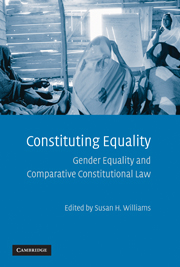Book contents
- Frontmatter
- Contents
- List of Contributors
- Acknowledgments
- CONSTITUTING EQUALITY
- Introduction: Comparative Constitutional Law, Gender Equality, and Constitutional Design
- SECTION ONE STRUCTURE
- SECTION TWO RIGHTS
- SECTION THREE CULTURE/RELIGION AND GENDER EQUALITY
- SECTION FOUR CONSTITUTIONS AND INTERNATIONAL LAW
- SECTION FIVE WOMEN IN THE PROCESS OF CONSTITUTION MAKING
- Conclusion: Gender Equality and the Idea of a Constitution: Entrenchment, Jurisdiction, and Interpretation
- Index
- References
Introduction: Comparative Constitutional Law, Gender Equality, and Constitutional Design
Published online by Cambridge University Press: 26 October 2009
- Frontmatter
- Contents
- List of Contributors
- Acknowledgments
- CONSTITUTING EQUALITY
- Introduction: Comparative Constitutional Law, Gender Equality, and Constitutional Design
- SECTION ONE STRUCTURE
- SECTION TWO RIGHTS
- SECTION THREE CULTURE/RELIGION AND GENDER EQUALITY
- SECTION FOUR CONSTITUTIONS AND INTERNATIONAL LAW
- SECTION FIVE WOMEN IN THE PROCESS OF CONSTITUTION MAKING
- Conclusion: Gender Equality and the Idea of a Constitution: Entrenchment, Jurisdiction, and Interpretation
- Index
- References
Summary
Constitutionalism is sweeping the world. Since 1990, at least 110 countries around the globe have been engaged in writing new constitutions or major revisions of old ones. In many of these countries, issues of gender equality have been a central concern in the constitutional process. Women have been active participants in these constitutional projects, and they have worked for the inclusion of a broad range of constitutional provisions and mechanisms to promote gender equality. One might expect that this phenomenon of worldwide constitution drafting would have generated a rich literature concerning gender-equality issues in comparative constitutional law, but, in fact, it has not. As the editors of one of the very few books on the subject put it, “there is a huge gap – a gender gap – in contemporary comparative constitutional analysis.”
The lack of attention to these issues in the literature became painfully clear to me in 2003, when I began to work with women's groups from Burma and Liberia on constitutional reform addressing gender-equality issues. For the past several years, I have been working with constitutional drafting teams in the Burmese democracy movement to write state and federal constitutions that will, hopefully, one day soon, provide the legal frameworks for a free and democratic Burma. As part of this work, I have acted as an advisor to the Women's League of Burma (WLB) – an umbrella organization for many of the women's groups in the democracy movement – helping them draft constitutional provisions addressing most of the issues in this book, write position papers, and design advocacy campaigns in support of these provisions.
- Type
- Chapter
- Information
- Constituting EqualityGender Equality and Comparative Constitutional Law, pp. 1 - 26Publisher: Cambridge University PressPrint publication year: 2009
References
- 4
- Cited by



